Belfast rap group Kneecap: “Our music is provocative, but it’s a mirror to society”

Since 2017, the controversy-baiting trio have nurtured a DIY Irish-language music scene. Now, they're on the cusp of an international breakthough, and their drug-addled biopic has won an award at the Sundance Film Festival.
Music
Words: Anna Cafolla
Photography: Sarah Ellis
It’s a baltic December night in Belfast. Christmas is only a few days away and the Ulster Hall’s 1,850-strong crowd of all ages is feverish. An acronymic chant swirls: “C‑E-A-R-T‑A”. As is typical of a night out in Belfast, a lot of boys have already removed their tops.
This 19th-century concert hall has hosted rock legends such as The Rolling Stones and Led Zeppelin, who performed Stairway to Heaven for the first time here in 1971. It’s also been a hotbed of Ulster Unionism, the venue where a Loyalist paramilitary group was launched and where politician-reverend Ian Paisley would preach fire and brimstone through the Troubles, abhorring talks of peace if it meant compromising with Irish Republicans.
Tonight, the Ulster Hall stage belongs to Kneecap – a trio known by stage names Mo Chara, Móglaí Bap and DJ Provaí – who are playing a homecoming show after a string of American gigs. Rappers Mo Chara and Móglaí Bap pace the stage, spitting acerbic lyrics – in both Gaeilge (Irish) and English – about drugs, drink and the dole while brandishing bottles of Buckfast. DJ Provaí, Irish flag balaclava on, holds court behind the decks, dropping tracks ranging from hard-hitting trap, grizzly punk-rap and club-ready house. A Palestine flag is pitched onstage, while cartoons of police Land Rovers alight and Union Jack-stamped bare arses appear onscreen. Lights and confetti explode in red and green. “I bet no one saw this coming 50 years ago,” shouts Mo Chara.
Kneecap match the frisson of the nebulous crowd, which is teeming with naked torsos and Irish tricolour flags, and mosh pits open up at their demand. They lead anti-establishment chants and jeer at their detractors, like notorious local radio/TV broadcaster and nemesis Stephen Nolan (“he can suck our balls”). Fan favourite Get Your Brits Out details an imagined, druggy night out with “Republican hoods” and DUP politicians. (Both Loyalist and Republican groups have taken offence to Kneecap’s crass lyrics about drugs and dealing, and they’ve sent the group violent threats on social media.)
“We’re working-class first, and there’s a bigger enemy out there,” shouts Móglaí Bap. “God bless the Good Friday Agreement. They want us divided.”
“It’s us and you 1,700 Fenian cunts”, Mo Chara bellows (“Fenian” is an Irish word for warrior; attributed to Republican revolutionaries, it’s also used to derogatorily describe Catholics). Regardless of creed or culture, with Kneecap tonight, we’re all Fenians.
“All the backlash we get isn’t real – it’s online, mad tabloids. We don’t get enough backlash, to be honest”
Mo Chara
Since Kneecap dropped their first track C.E.A.R.T.A (“rights” in Irish) in 2017, the group has soundtracked an Irish cultural resurgence. They’ve courted ever-widening curiosity outside of Ireland, in part sparked by viral clips of the group discussing Britain’s need to confront its colonial past, as well as media controversy; from a radio station ban to local DUP politicians condemning their “Brits out” chant at a pub where William and Kate had visited 24 hours before. Kneecap’s controversy fuels the anticipation of a forthcoming debut album that’s expected this summer and an amphetamine-fuelled biopic that recently debuted at the Sundance Film Festival.
A few weeks after the Ulster Hall show, we’re camped out in a corner of their local, the Hawthorn Bar, in West Belfast. When Móglaí Bap celebrated his 30th birthday here last year, the place recorded its highest takings ever. The pub is in a Nationalist area, where walls are painted with Republican heroes like Bobby Sands, odes to Nelson Mandela and calls for Irish reunification. Outside the Hawthorn Bar, Kneecap’s own murals loom: the infamous burning police Land Rover and an “England get out of Ireland” slogan.
“The people on the ‘other side’ aren’t our enemy,” says Mo Chara, 26, clutching a pint of Guinness. “Up the Shankill! Up the Falls!”, he adds, referencing Belfast’s Loyalist and Republican areas that border each other. “We always get people saying we’re promoting sectarianism. We’re all working-class. We’re satirical Fenian cunts.”
Móglaí Bap chips in: “Riling people up amplifies what we want. People have emotional reactions, but there’s real-life consequences to Brexit, the border, occupation to confront.”
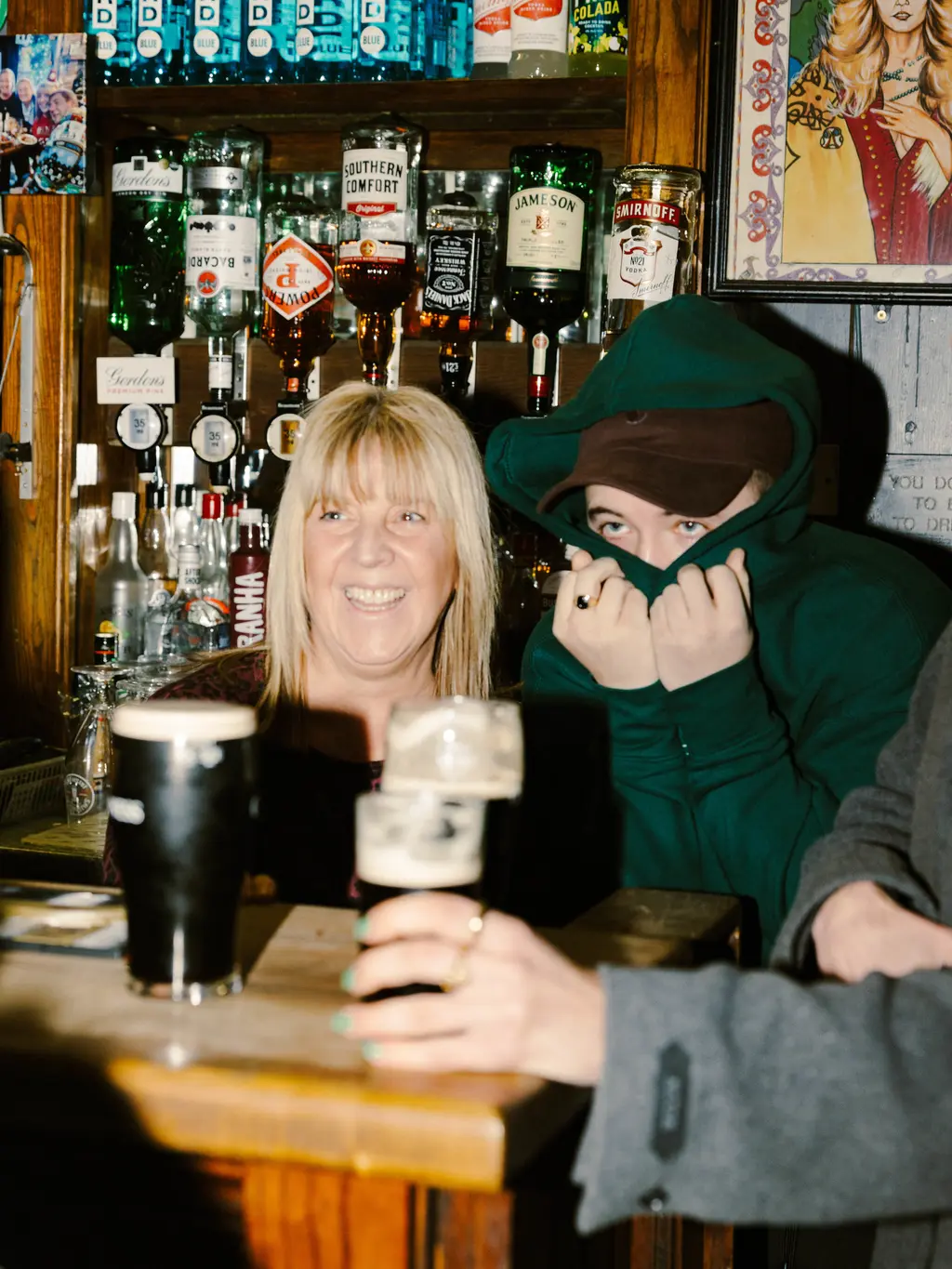
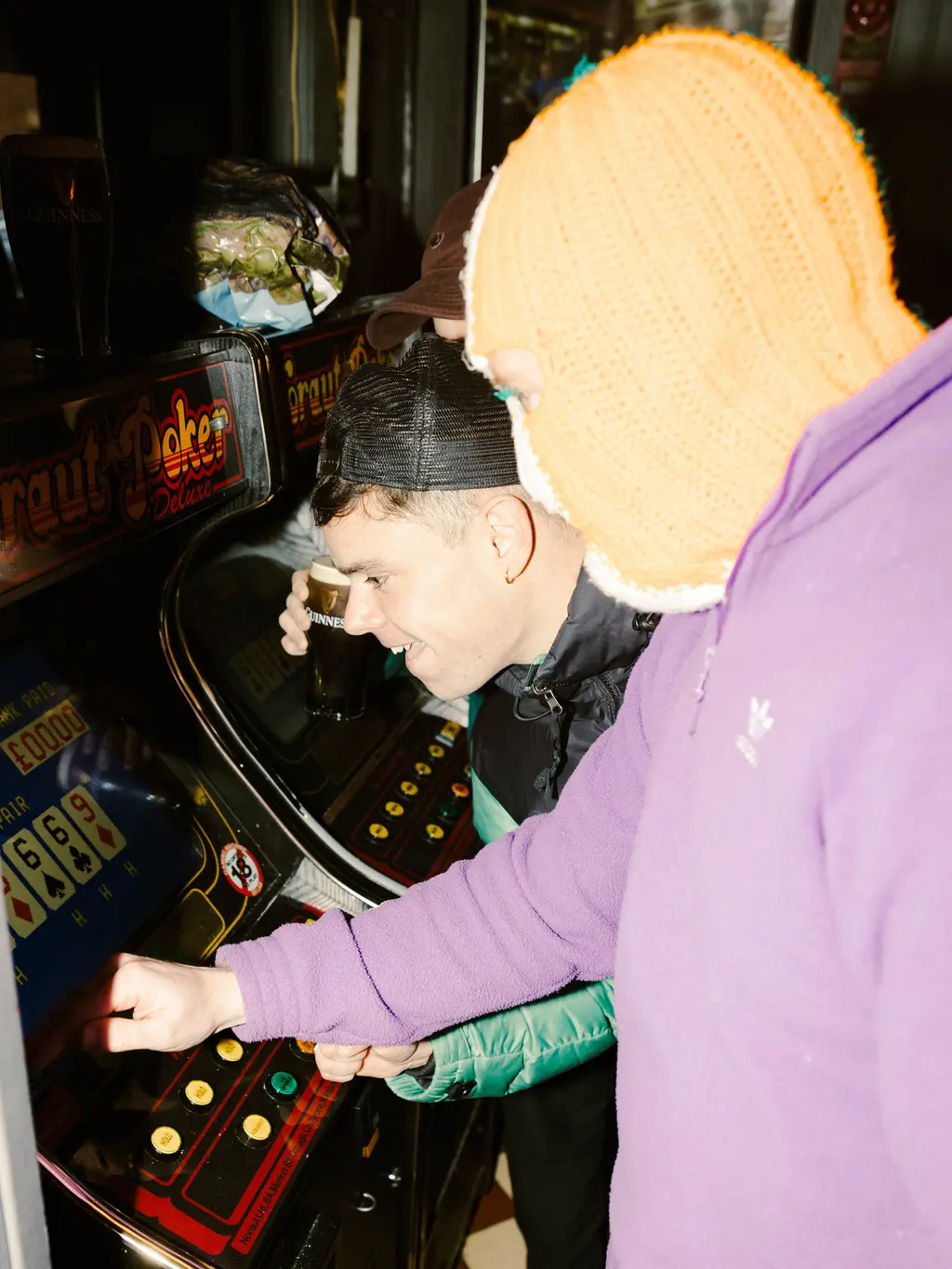
The Hawthorn’s bar manager comes over to our table to return Móglaí Bap’s childhood photos from his party. “How well have our boys done?” she says, smiling at me. “We’re all so proud.” She keeps the cups of hot milky tea and Tunnock’s caramel wafers coming, and updates the group on local news and goings-on: who’s off the drink for good this time, who’s ill, dying and dead, how the boujie breakfast-burger spot up the road is faring.
We’re here just after school finishes and a group of kids pile into the bar and start chatting to us in Irish. “Táim chun Taylor Swift a fheiceáil [“I’m going to see Taylor Swift”,” one girl tells us. DJ Próvaí, 34, reveals the fresh tattoo on his thigh – a full-colour image of his own balaclava-covered face – to everyone’s delight. Our interview is occasionally interrupted by older bar patrons, who ask the group about their forthcoming trip to Utah – known as Mormon country – for Sundance “Picking up some wives, are yiz?”
So, I ask, how did Kneecap meet?
“Grindr”.
I try again. It turns out Móglaí Bap and Mo Chara met down the road at Cultúrlann, an Irish language cultural centre, where the former organised Irish language festival Liú Lúnasa. In 2017, an Irish Language Act march was organised, calling for the Irish language to have equal status to English. The government at Stormont had collapsed and conflict between Republican Sinn Féin and Unionist DUP over the issue was stalling the return of power-sharing. Thousands of protesters marched through Belfast chanting, “Tír gan teanga, tír gan anam” (“A country without a language is a country without a soul”).
The day before the march, Móglaí Bap and a friend were pursued by the police for spray-painting Irish slogans, including “C.E.A.R.T.A”. Móglaí Bap’s mate was apprehended and he only spoke Irish to the authorities, who had no interpreter arranged for him. This became the inspiration for their first track.
“Our genesis,” says DJ Provaí.
“Where the fuck you getting that word!?” says Mo Chara, laughing.

“There was no contemporary Irish language [music] scene for us,” says Móglaí. “[But] you end up coming together when you’re partying.” Móglaí Bap and Mo Chara, who’ve known each other for around 13 years, took over a transformed a former youth club into party squat, where they’d blast techno, rap and Irish rebel tunes. They met DJ Provaí, from Derry, in the party scene and started working on tunes together sporadically.
Kneecap are Gaeilgeoirs, i.e. native Irish speakers – Irish is Móglaí Bap’s first language – and they all speak it with friends and family. So producing music in their tongue is natural. “We’re not sitting about in Aran jumpers lamenting the Irish language,” says Mo Chara, “[but] we live and survive and celebrate through it.” Only about 10.6% of people in the North say they have some knowledge of Irish. The Identity and Language Bill was passed in December 2022, offering official recognition, protection and investment in the language. Irish language signs have since been approved for several Belfast streets and the first Irish medium primary school in East Belfast – a historically Loyalist area – will open later this year.
“We weren’t able to take control or use our imagination with our language,” says Móglaí Bap. “It was the language of school, old times, shame. We represent a new world of urbanity and opportunity for Irish speakers.”
Kneecap’s first gig was in 2018 at a bar in Gaoth Dobhair, a Gaeltacht area of Donegal. “It was mental,” says Móglaí Bap. “Piss drunk, full of MDMA, with about six songs.” DJ Provaí couldn’t get the laptop working and Móglaí Bap launched into the first verse without his mic on. But they provoked a triumphant reaction of chaos and crowd-surfing.
“There’s a lack of understanding about the systems that uphold class division, sectarianism and racism. It props up the powerful. Ireland is multicultural. It’s not a United Ireland just for the Irish”
Móglaí Bap
Kneecap’s music reflects their lived experiences as young people in a post-conflict landscape, finding caustic humour in the down and out. The group’s name, even, is a cheeky reference to paramilitary punishment. “Our music’s provocative, but it’s [holding] a mirror up to society,” says DJ Provaí.
While Kneecap were gaining a cult following, picking up festival bookings and gigging around Ireland and the UK, DJ Provaí continued teaching Irish at a Catholic secondary school. At a 2019 gig in Belfast, he saw some of his A‑level students peering up at him. “Next day, they’re all standing at the back of the classroom with big cheesers,” he says.
The school confronted him. “That’s not me! That’s not me!” Mo Chara raps a la Skepta, cackling. DJ Provaí reads me the investigation letter from his phone, where Kneecap’s YouTube channel was used as damning evidence against him: “a masked member moons the camera with ‘Brits Out’ on each buttock”; “he appears to snort a white substance”. “Imagine the nuns watching my bare arse,” he says laughing. He left teaching in 2020 – Monday lie-ins began and finding a producer for their debut album got serious. Kneecap dropped their debut mixtape in 2021, called 3CAG.
The group found a fan in Toddla T, the Sheffield DJ/producer who’s known to join dots between rap and club music. They got hold of his number and after a few texts flew to London to have a studio session. “T’s energy is infectious. It brought out the best in us,” says Mo Chara. In two hours, Kneecap had a grime-influenced banger, Fine Art, lighting the fuse for their debut album. “Eighty per cent of the album was done [with Toddla T] in four weeks,” says Mo Chara. “Thank fuck for ADHD, right?”
The record features collaborators including Fontaines D.C. frontman Grian Chatten (who they met in a Belfast pub) on lead single Better Way To Live, a hazy, scuzzy guitar tune about finding clarity and joy on a break from booze. The singer Niamh Hinchy, Móglaí Bap’s girlfriend, is on a garage-indebted party track, while folklorist and writer of 32 Words For Fields: Lost Words of the Irish Landscape Manchán Magan also features. “He’s so cool,” DJ Provaí says of Magan. “He traces the Irish language all over the world, and how cultures and languages intertwine from Egypt to India and Ireland. It’s class. We want to really incorporate all different levels of Irish language and culture on the record.” Interludes recall their moments pissing off national TV broadcaster RTÉ and the DUP. They sample beats from Dancing on Narrow Ground, a 90s documentary where rave presents brief escapism for young Catholics and Protestants.
Kneecap don’t tell me the name of their debut album, which is expected to be released in the summer, but they do reveal that there’s a narrative thread of a story set in a pub, which they intend to develop into an album trilogy. “It’s a mish-mash of our own experiences, going a bit insane, and issues that speak to young people here,” says Móglaí Bap. “The pub concept builds on having the highs and lows of getting on it, the anxiety of the day after. We’re taking away the taboos of youth culture.”
“But we’ll never go out of our way to proclaim we represent an era,” says Mo Chara. “If people take positive ideas away from it or feel represented, that’s amazing.”

That’s genuine sentiment. They’ve had meaningful conversations with Shankill rapper Young Spencer. Móglaí Bap recalls walking through the Loyalist area Sandy Row on 12th July (the Battle of the Boyne’s anniversary) and hearing kids chant “C‑E-A-R-T‑A”. “I paused, like, ‘If they’re gonna jump me they wouldn’t be singing the chorus.’ I started chatting to them, sharing Buckfast. It’s not about politics, it’s about getting lit. I put them on our guestlist.
“There’s a lack of understanding about the systems that uphold class division, sectarianism and racism. It props up the powerful. Ireland is multicultural. It’s not a United Ireland just for the Irish. Get rid of the monarchy, and the Catholic Church too.”
Kneecap recently aired some of their political views with Jeremy Corbyn, who interviewed them on camera in his son’s North London CBD café for his Peace & Justice Project platform. They discussed the importance of artists speaking up and the affinity between Ireland and Palestine, with shared histories and experience as colonial projects in protracted conflicts. Kneecap were extremely hungover from a gig – DJ Provaí buoyed himself with a breakfast of two poached eggs and a glass of red wine, sipping a cappuccino during the interview through his balaclava. “Jeremy didn’t flinch,” he says.
Kneecap are a part of the Irish Artists for Palestine movement, for which they perform at fundraisers for medical aid in Gaza. It’s a longstanding commitment – one of their earliest gigs raised money for Móglaí Bap’s brother to open a community gym for the Aida refugee camp in the West Bank. In November 2023, police arrived before their Newcastle show to warn venue organisers that they were “aggressively pro-Palestine”. “I was dying for the police to turn up,” says Mo Chara. “All the backlash we get isn’t real – it’s online, mad tabloids. We don’t get enough backlash, to be honest.”
Kneecap’s origin story is told in the hilarious biopic Kneecap, co-written with director Rich Peppiatt. Premiering at Sundance in January, it was the first Irish language film to be shown at the festival. To promote it, Kneecap drove a graffitied, armoured police van through the Park City streets. They showed up to local Palestine marches, too, and managed to piss off the Daily Mail, who argued that they were “glorifying the IRA” with the film’s public funding. The film won the Audience award at Sundance and has been acquired for wider release by Sony.
In Kneecap, the group play semi-fictional versions of themselves, self-styled “hoods and low life scum” (DJ Provaí’s teacher plotline features) grasping at a semblance of identity, navigating social, family and relationship pressures that constrict their musical dreams. The Irish language is not a plot device, but a liberating creative channel. Their acting is impressive, the lines of ket are long and unreleased album tunes propel the propulsive narrative.
The group did acting lessons twice a week for six months. “We weren’t studying Stanislavski or anything, but it was rough,” says Mo Chara. “Have you ever stared into your mate’s eyes for five minutes? Fucking hell.” Simone Kirby plays Móglaí Bap’s mother and Michael Fassbender plays his Republican-on-the-run father. DJ Provaí helped Fassbender perfect the Ulster-accented Irish over Zoom.
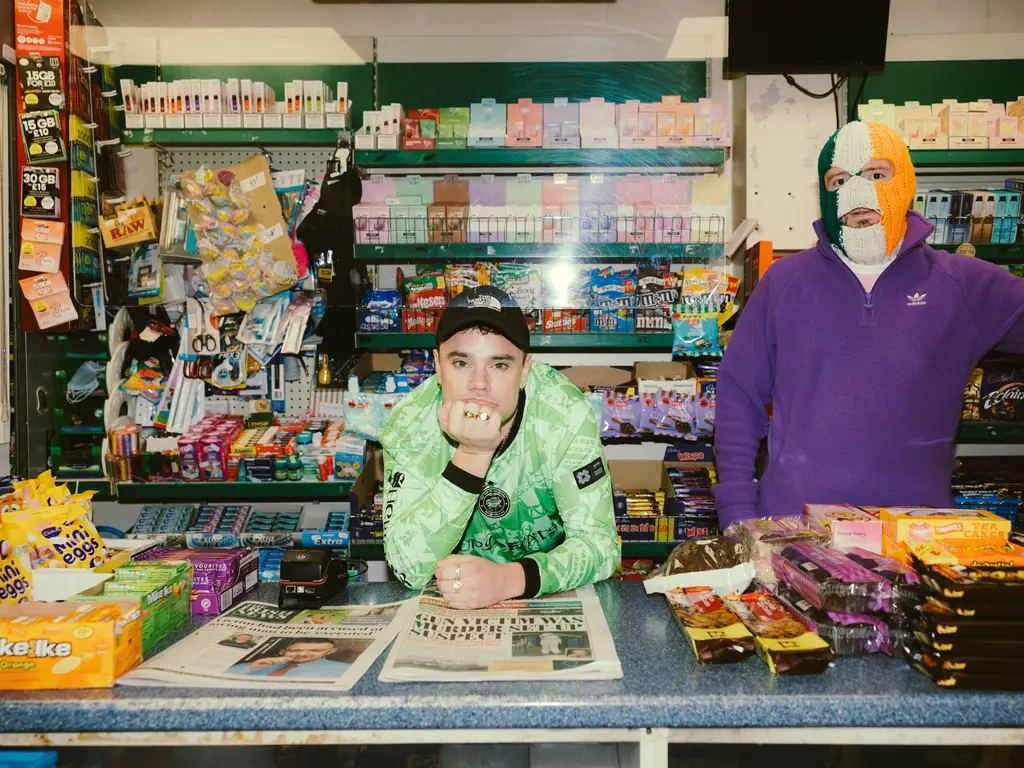
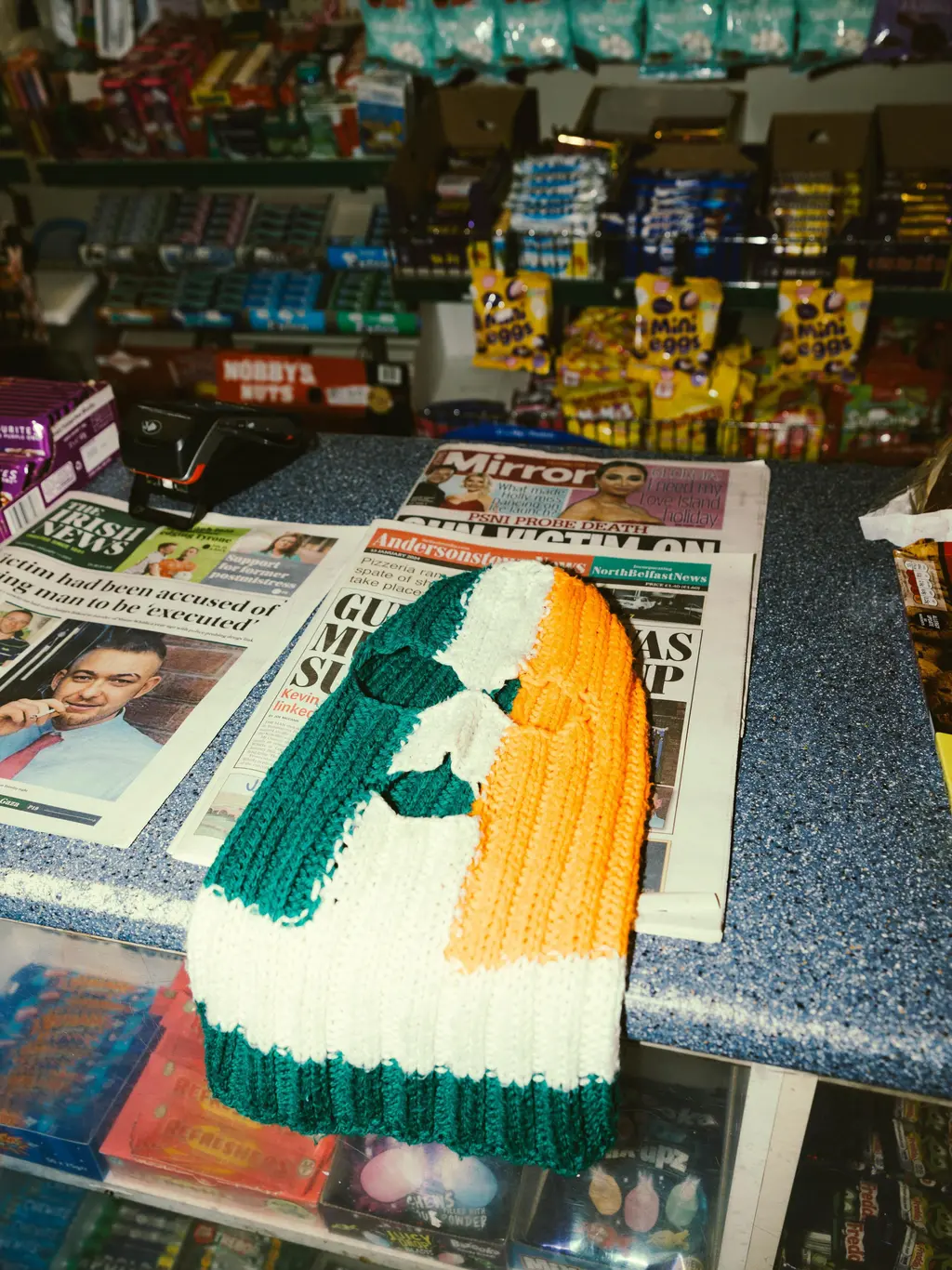
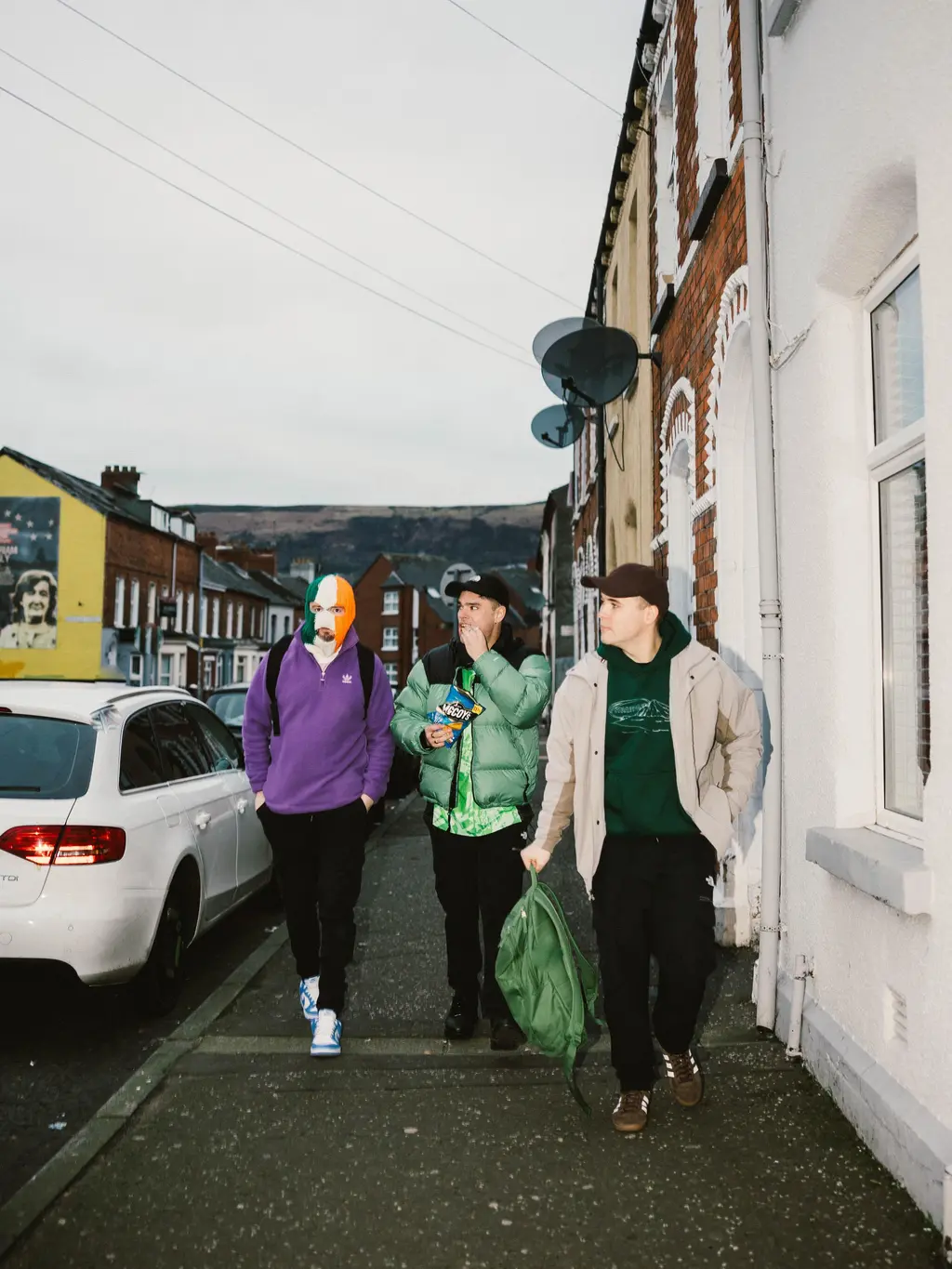
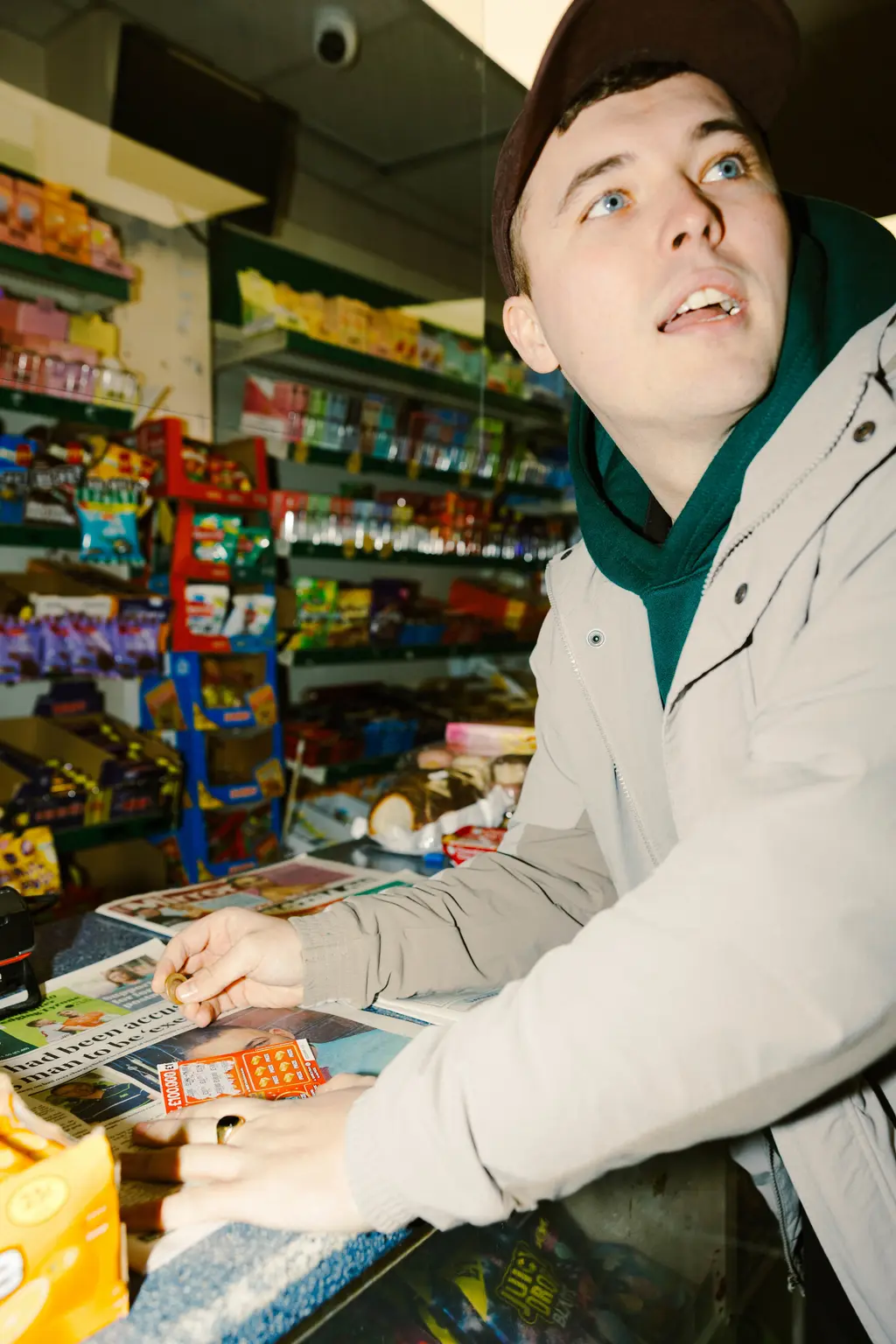
“We want people to see that you can do stuff in Irish to the highest quality. There’s a new standard,” says DJ Provaí. “It’s not tokenistic, it’s star quality that happens to be in Irish. There are so many possibilities.”
Before the film’s wider release later this year, the band will be fulfilling a growing number of international tour dates, putting final touches to the album and hoping that more British tabloids get bristling.
We’ve talked for two hours and it’s time to wrap up and move on to Guinness (pulled to varying levels of success by Móglaí Bap, to other patrons’ mickey-taking) and cheese toasties from the George Foreman grill perched on the bar. We venture out to the streets, where local kids chat to them excitedly in Irish, and a shopkeeper (whose shop featured in a previous music video) sells us some scratch cards and Taytos while we take photos.
Then, it’s back to the Hawthorn.
“We’re about four pints deep,” says Mo Chara.
“Three?” checks Móglaí Bap.
“Well then, I’m away to get another one! Slàinte!”







